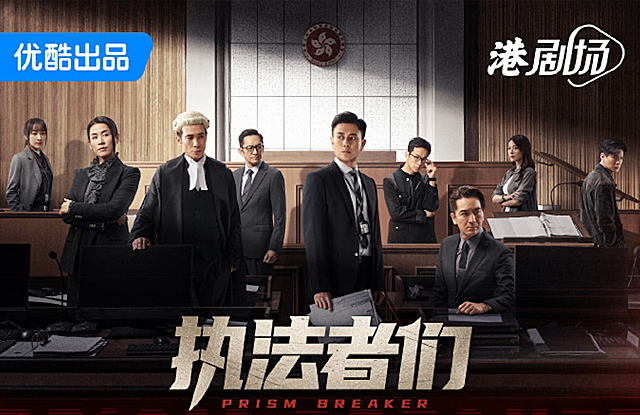No Sleep for TVB Artists

TVB has always been under the scrutiny for having long work hours and virtually no breaks for their artists. However, it was not until Sheren Tang (鄧萃雯) lashed out about TVB’s poor work ethics did this issue finally grab attention. Because Sheren openly spoke poorly of TVB, it was rumored that she is no longer on good terms with upper management as well as fellow actors and actresses. To improve their image, TVB announced that starting next year, artists would hopefully be given eight hours of rest as well as a script that is at least 80 percent complete to ensure smoother filming activities.
No Sleep for Artists
Due to a lack of sleep, Tavia Yeung (楊怡) was seen with swollen eyes after filming nonstop for the new series, Property Protector <守業者>. Falling ill, she was not able to accompany Kenneth Ma (馬國明) to Shanghai for The Hippocratic Crush II’s <On call 36小時II> promotional event.
Other cast members of Property Protector have also suffered from major fatigue. Raymond Cho (曹永廉) only managed to get two hours of sleep and had to resume filming in the early morning with no break. Katy Kung (龔嘉欣) did not explicitly express that she was tired from filming, but she left the studio at midnight – confirming the theory that artists at TVB have to work late hours in order to finish filming.
Samantha Ko’s (高海寧) hectic schedule is no different from fellow co-workers, having to pull two nights of work without sleep while still filming the following morning. Even after having two sleepless nights, she was not dismissed from work until 3 a.m. the next morning. When the news of artists’ dissatisfaction with filming schedules was published, Samantha took initiative to clarify her statements on Weibo to remain in good terms with TVB management. “Even though we have to film throughout the night, we do get sufficient rest! We always have fun filming, so there’s no need to worry about me!”
Sources: Apple Daily; Apple Daily
This article is written by Su for JayneStars.com.











Is that Samantha Ko in the left photo?
Could someone explain to me? Why is the condition like this? Why are they in rush when filming TVB dramas? Has it always been like this?
TVB has to rush with the filming as – unlike other countries like South Korea – they show everyday an episode except for weekend. In South Korea, most of the dramas are showns twice a week, hence they have more time to film resulting in a less busier schedule.
Umm… South Korea has the live-shoot system, which puts the cast and crew under even more stressful conditions. And I’m sure they suffer from sleep deprivation just like these TVB artists, too.
I agree with skinnymocha as well. South Korean actors also suffer from sleep deprivation. If you do enough research by reading some online articles, you’ll find out that they also don’t sleep for days sometimes. Just by watching videos and interviews, you can tell how tired the actors are…
@wtf: Yes, it has always been like this – from the 1970s until current, TVB artists have had to work their butts off filming day and night without rest. Actually, to be honest, the artists currently have it a lot easier – back in the 80s, a lot of the most popular artists not only filmed non-stop, they had to carry multiple series on their shoulders at one time due to the high demand….so essentially, those artists would finish filming with one team, then run off to another one and when done with that one, then off to another…forget sleeping and resting – the artists barely even had time to eat or change their clothes (some of them would literally nod off sitting in the makeup chair while someone does their hair and makeup)!
As to why it’s this way – well, can’t really answer in one sentence, as it’s a combination of many factors (late scripts, scheduling conflicts amongst artists, booking schedule at the studio and offsite, production process, etc.). With the number of series that TVB churns out every year (usually between 20 to 25 a year) and all the coordination involved (keep in mind that majority of HK artists are multi-faceted in that they are also involved in movies, music, theater, etc. …plus factor in the various shows, events, endorsements, etc. that take up the more popular artists’ schedules as well…), it’s almost impossible for their productions to not be rushed. This is why I’m really curious to see how (or rather, IF) TVB is going to pull off the 8 hour rest and 80% script thing next year – it sounds simple but with the way the process works, it’s harder to implement than people think….
llwy12With the number of series that TVB churns out every year (usually between 20 to 25 a year [..]it’s almost impossible for their productions to not be rushed.
And yet many series are left sitting on shelves for years on end in a dark warehouse collecting dust and outdated; some never got aired even; some released overseas because of overstock. So exactly why the rush when only a specific number of series can be aired within a year?
@clamine: Good question! That’s why I’ve always felt there was a disconnect somewhere in the way TVB runs their company. My guess is that they decide to warehouse a particular series usually for some type of internal political reason, but no one ‘monitors’ what gets put in the warehouse, so everyone forgets about the series until years later (when one of the execs perhaps finally had his/her cup of coffee and realized they still had stuff collecting dust in the warehouse? LOL).
Earlier this year (I’m assuming it’s due to the change in owner) looks like TVB finally got around to cleaning out that warehouse, as they FINALLY aired a series that had been sitting in there collecting dust for 10 years (literally, as the series was made back in 2003 and they aired it for the first time in HK in 2013…talk about ‘forgotten’ series! LOL).
I’m extremely sceptical that TVB will actually be able to deliver the 80% script promise. Their production schedule (over 20 series per year) is simply too aggressive.
How they manage to produce excess series resulting in some series getting warehoused is a mystery to me too. They don’t seem to plan their broadcast schedule far ahead of time — it seems that at the point of time that a series is greenlit, they don’t think about where on the schedule it’s going to air.
It still happens until current times. There are artistes who don’t get to sleep at all for more than 24 hours because of filming dramas and movies at once, and harder when they have to juggle different personalities and characters, this is mentioned by a producer himself and not just by artistes. Hard to judge these artistes too for taking double projects, sometimes it’s managed by TVB and sometimes they’re doing it out of gratitude or “friendship” with the producers.
I doubt the change will happen that soon, it might take time since production teams in TVB are too used to the “rushing” method.
Simple and most important reason is to keep production costs low and that includes being able to transition artists and crew to other projects in the least amount of time.
It’s slave house productions.
my guess is everyone is waiting around for other people to complete their parts. The fact that the script is so late does not help. So they have to wait for the script, insufficient preparation time lead to poor performance, so they have to re-shoot. it is a vicious circle
nitpicking: Raymond Cho managed to get three hours of sleep, not 2 as translated.
Where’s their actor’s union in all of this? Or do they even have one and it’s lousy?
They have one but it is lousy.
It is not just TVB but everywhere. Filming time is uncertain although the more famous have more favourable schedule with perks. I was watching some TMO of some hollywood films. same condition. Few hours sleep. Except they have a huge trailer nearby. Experienced actors learn to sleep anywhere in any condition.
@Funn: True, things like that happen everywhere, but at a far lesser extent in Hollywood compared to many of the Asian countries like HK and China. At least here in the U.S. (though also depends on which state you work/live in), there are tough labor laws that most companies abide by, so it’s harder to get away with some of the stuff that happens in Asian countries. Most of the Chinese artists who’ve had the opportunity to work in Hollywood have commented on how the filming process is so different (I remember Jackie Chan even complaining once how the process is so much more drawn out here and it takes too long for a film to get made because of all the labor law requirements…yea, he was actually complaining that artists here have it too easy…LOL). In essence, employers here are prevented by law from treating their employees like ‘slaves’ – i.e. in California, there are labor laws that require employers to offer rest breaks to their employees every couple hours and an extended break (lunch break) after 5 hours…and if an employee works more than 8 hours in a day, employers are required to pay overtime (those are just 2 examples…there are actually a lot more rules/laws than what I mentioned…). Of course, there will always be shady companies that try to avoid following the laws, but most big, reputable companies will follow these laws for fear of being sued (since it’s so easy to sue here in the U.S. too…LOL) or being penalized by the government.
Now of course, if the actors/actresses themselves choose to work longer hours (as alot of them do so as not to fall behind schedule), then that’s their prerogative (and needless to say they can’t sue or anything like that because they chose to do it)….but at least there are laws to protect the employers (the production companies in this case) from taking advantage.
sorry..I meant “…laws to PREVENT the employers from taking advantage” (darn it, I really need an edit button…hahaha).
In the US, all actors and production crew are essentially independent contractors and therefore not protected by any state labor laws. This is very different than say the TVB situation where the network is technically the employer and all actors and crew are technically employees.
That said, however, all Hollywood actors and production crew belong to unions, which would specify and negotiate with production companies all matters related to work including compensation with respect to the production crew.
The beauty of this system is that the production companies must comply with the unions’ working terms if they needed the service of the crew and actors. Now the companies could bypass this legally by getting non-unionized crew but they tend to be low caliber and the unions would “raise hell” with the filming process.